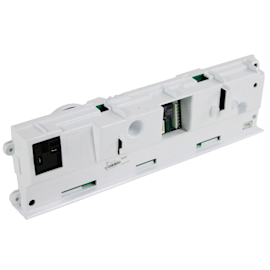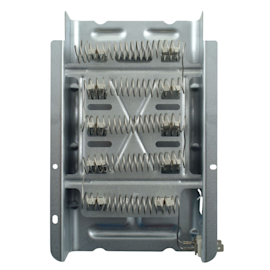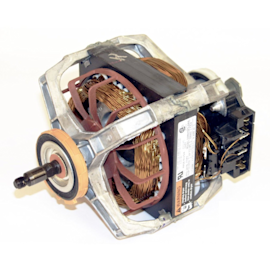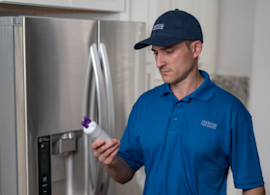How to maintain a Kenmore hybrid heat pump dryer


Routine maintenance of a Kemore hybrid heat pump dryer is very similar to a standard dryer. By following a care and maintenance routine, you can help extend the dryer's life.
Lint filter care
Before each cycle, clean the lint filter. Open the dryer door and pull the lint filter straight up. Roll the lint off the screen using your fingers. Place the filter back into the filter housing and press down until it clicks, locking in place. If the lint filter is loose or missing, an error code of F0 will occur and the dryer will not operate.
Fabric softeners can build up on the lint filter screen over time, restricting airflow. If the screen looks dark or dirty after removing the lint, clean the filter using hot soapy water and a stiff brush. Let it dry completely before reinstalling.
Interior and exterior cleaning
To prevent damage to the dryer door seal caused by lint and dust buildup, periodically wipe around the door opening and seal with a clean, damp cloth. Clean the window with warm water and a mild, nonabrasive detergent, then wipe dry.
Use warm water and a nonabrasive detergent to clean exterior surfaces. Wipe off any spills immediately with a soft, damp cloth. Never use steel wool or abrasive cleaners, as they will scratch and damage the surface. Remove lint and dust from around and under the dryer with a vacuum cleaner.
Maintaining the exhaust system
The most common cause of dryer problems is poor exhaust venting. Once a month, check the vent ducts for lint buildup. Clean the home’s vent ducts once a year to remove and prevent blockages in airflow.
The dryer monitors venting conditions continuously. If over several cycles it detects a problem with airflow, the Check Vent indicator light will blink. If the light blinks, stop the dryer and check for any kinks in the vent hose or obstructions in the vent duct.
Once the problem is corrected, it may take several cycles for the dryer sensor to reset and stop blinking.
Most common symptoms to help you fix your dryers
Choose a symptom to see related dryer repairs.
Main causes: bad gas valve coils, broken heating element, tripped safety thermostat or fuse, bad operating thermostat, c…
Main causes: bad drum support roller, damaged idler pulley, broken blower fan blade, worn drum glide bearing, bad drive …
Main causes: damaged door strike, worn door catch…
Main causes: clogged exhaust vent, bad motor relay, loose dryer door catch, bad door switch, control system failure, fau…
Main causes: door switch failure, lack of power, broken belt, blown thermal fuse, bad drive motor, control system failur…
Main causes: clogged exhaust system, heating system failure, deposits on moisture sensor, control system failure…
Main causes: bad timer or electronic control board, door switch failure…
Main causes: lack of electrical power, bad power cord, wiring failure, bad control board, blown thermal fuse, bad door s…
Most common repair guides to help fix your dryers
These step-by-step repair guides will help you safely fix what’s broken on your dryer.

How to replace an electronic control board in an electric dryer
The electronic control board manages the components and controls the cycle times in your electric dryer. Follow these st…

How to replace a heating element in an electric dryer
The heating element in an electric dryer generates the dryer's heat—it's one of the first things to check if the air in …

How to replace a dryer drive motor
A defective drive motor struggles to rotate the drum or might not turn the drum at all. Follow the steps in this dryer r…
Effective articles & videos to help repair your dryers
Use the advice and tips in these articles and videos to get the most out of your dryer.

Get expert tips on using your dryer efficiently to save energy.…

Learn about all the convenient features on our Sears PartsDirect website that make your parts purchases easier.…

Get answers to frequently asked questions about Sears and Sears PartsDirect.…
